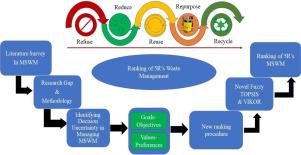基于多准则群体决策技术的城市生活垃圾可持续管理系统研究
IF 8
2区 计算机科学
Q1 AUTOMATION & CONTROL SYSTEMS
Engineering Applications of Artificial Intelligence
Pub Date : 2025-03-21
DOI:10.1016/j.engappai.2024.109393
引用次数: 0
摘要
城市固体废物管理是一个与经济、社会和环境相交叉的重要社会生态系统,是可持续发展的一个独特方面。一些发达国家实行按量收费的做法是促进回收和减少废物的一个步骤。然而,高回收目标的可持续性和公众满意度对废物管理效率的影响是需要进一步探索的领域。回顾了各国关于城市固体废物管理和技术选择的文献,发现许多研究需要更精确的理由和解决决策中的模糊性。与此同时,一些研究人员在废物管理的背景下发展了模糊多准则决策技术。然而,仍然需要确定“5R”(拒绝、减少、再利用、重新利用、再循环)废物管理技术选择的重要绩效标准和因果组标准。这项研究强烈强调了“5R”废物管理系统的潜力,以彻底改变废物管理实践。“5R”废物管理系统使用基于模糊的人工智能方法的多标准群体决策技术,采用新颖的模糊技术,通过与理想解决方案的相似性来确定偏好顺序。本文还提出了一种对广义区间2型梯形模糊数进行排序和去模糊化的新方法,以解决使用模糊语言项进行决策时产生的不确定性。最后,用新的排名方法讨论了一个“5R”废物管理问题的数值例子,并与现有方法进行了比较,强调了“5R”废物管理系统的巨大潜力。本文章由计算机程序翻译,如有差异,请以英文原文为准。

A study on sustainable system for managing municipal solid waste through a multi-criteria group decision-making technique
Municipal solid waste management, a unique aspect of sustainable development, is a crucial social-ecological system that intersects with the economy, society, and environment. The introduction of volume-based waste fees in some developed countries has been a step towards promoting recycling and waste reduction. However, the sustainability of high recycling targets and the impact of public satisfaction on waste management efficiency are areas that demand further exploration. A review of the literature on municipal solid waste management and technology selection from various countries reveals that many studies need more precise justification and a resolution to the ambiguity in decision-making. Meanwhile, some researchers have developed the fuzzy multi-criteria decision-making technique in the context of waste management. However, significant performance criteria for ’5R’s (refuse, reduce, reuse, repurpose, recycle)’ waste management technology selection and cause-and-effect group criteria still need to be identified. This study strongly emphasizes the potential of the ’5R’s’ waste management system to revolutionize waste management practices. The ’5R’s’ waste management system uses a multi-criteria group decision-making technique using fuzzy-based artificial intelligence methods, employing the novel fuzzy technique for order of preference by similarity to the ideal solution. This study also proposes a new way to rank generalized interval type-2 trapezoidal fuzzy numbers and defuzzifies them to address the uncertainties that arise when using fuzzy linguistic terms to make decisions. Finally, a numerical example of the ’5R’s’ waste management problem is discussed with new ranking methods and compared with existing methods, underscoring the significant potential of the ’5R’s’ waste management system.
求助全文
通过发布文献求助,成功后即可免费获取论文全文。
去求助
来源期刊

Engineering Applications of Artificial Intelligence
工程技术-工程:电子与电气
CiteScore
9.60
自引率
10.00%
发文量
505
审稿时长
68 days
期刊介绍:
Artificial Intelligence (AI) is pivotal in driving the fourth industrial revolution, witnessing remarkable advancements across various machine learning methodologies. AI techniques have become indispensable tools for practicing engineers, enabling them to tackle previously insurmountable challenges. Engineering Applications of Artificial Intelligence serves as a global platform for the swift dissemination of research elucidating the practical application of AI methods across all engineering disciplines. Submitted papers are expected to present novel aspects of AI utilized in real-world engineering applications, validated using publicly available datasets to ensure the replicability of research outcomes. Join us in exploring the transformative potential of AI in engineering.
 求助内容:
求助内容: 应助结果提醒方式:
应助结果提醒方式:


